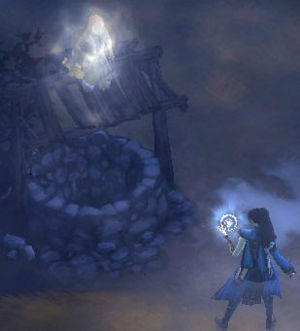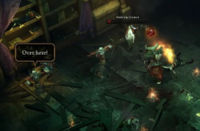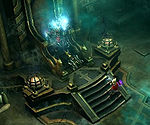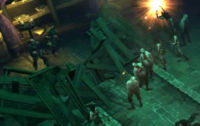Difference between revisions of "Quest"
m |
m |
||
| Line 1: | Line 1: | ||
| − | + | ||
[[Image:Q-little-girl-ghost.jpg|thumb|300px|right|A [[Wizard]] completes the [[Little Girl Lost]] quest.]] | [[Image:Q-little-girl-ghost.jpg|thumb|300px|right|A [[Wizard]] completes the [[Little Girl Lost]] quest.]] | ||
| Line 200: | Line 200: | ||
[[category:basics]] | [[category:basics]] | ||
[[Category:Featured articles]] | [[Category:Featured articles]] | ||
| + | |||
| + | {{BC}} | ||
Revision as of 02:49, 5 March 2013
Diablo 3 Quests are how a character progresses through the story or accomplishes tasks. Quests are missions with varying levels of complicated objectives, normally giving the player experience, gold, items or other rewards when completed.
Quests in Diablo III will be made more in line with the story, and less obtrusive than traditional action RPGs. There are core storyline quests in all acts, plus numerous side quests, random quests, and other smaller adventures to spice up and vary the gameplay experience.
- See the Quest window article for more information about the quests interface window.
Contents
Diablo III Quests
The D3 Team wants to improve on how quests were handled in Diablo II. They want the major quests to be interesting, important, and plot-driven. Many of these quests will be character-specific; your character won't (always) just be an errand boy and the quest won't just be something minor; it will advance the story.
Each act has numerous major, plot-related quests, all of which have various related minor quests related to them. Blizzard has released very little information about the game's plot, so the only quests known thus far were the ones seen in the playable demos at Blizzcon 2008 and 2009.
In addition to the official quests, there are numerous smaller "Adventures" which play like mini-quests. See the section further down this page for more details on them.
Kevin Martens spoke on the variety of quests in Diablo III in an April 2011 interview. [1]
Kevin Martens: The questing and story. I think we’ve added way more quests, more variety of quests. We’ve randomized the quests, and have these sort of quests that are self contained. For example, if you enter a dungeon in Diablo III, there might be somebody standing at the entrance, like a treasure hunter, saying, “Hey, I heard stories about The Idol of Rygnar is hidden somewhere in this dungeon. Help me find it and you can share in the reward.” Then you go through the dungeon and protect this guy. Then you’ll find the idol and you’ll get the reward.
People will turn on you…you’re never quite sure what is going to happen. We’re adding all those random elements all over the world. There is way more quest content overall than Diablo II, period. Also, I think we wanted to do a much better job on the storytelling aspects, not just the cinematics, which are fantastic, but also in the storytelling itself, like more twists and turns, more interesting quests, more variety of experiences. That’s what we spent a lot of time on, and making the co-op nature of it better as well.
Known Quests
All known quests were researched in the Blizzcon 2008 and 2009 playable demos. Details of these quests may change in the final game.
Click the quest names below to read full articles on each quest with many more details and screenshots.
Blizzcon 2008 Quests
All these quests were located in Tristram or the dungeons below the ruined town. The base camp at Tristram was quite small and inhabited by only two NPCs, neither of whom were merchants. It's expected that the full town of Tristram will be quite a bit larger. (Or this base camp might be where new characters begin the game, and they only reach the full Tristram after completing these introductory quests.)
Blizzcon 2009 Quests
All of these quests were located in the deserts of Act 2, somewhere in the mid-section of the act. Characters started out just beyond the walls of Caldeum, and could not return to the city. The designers revealed that this was a special fix just for the demo, since players would have seen a great deal of the game story in Caldeum, and the didn't want to reveal that much of it yet.
- Find Alcarnus
- Blood Money
- Stranded
- The Lost Girl
- Alesar's Pendant
- The Collapsing Tomb
- The Lost Wagon
- The Necromancer's Book
- A Miner's Gold
- The Idol of Rygnar
Quest names are tentative, and may change in the final game.
BlizzCon 2010 Quests
http://www.diablowiki.net/images/thumb/e/e5/Treasure-hunter3.jpg/180px-Treasure-hunter3.jpg
The 2010 BlizzCon demo had very few quests, compared to previous years, and the quests that were there were found in every game; they were not randomized at all, and only the three core storyline quests were ever present.
- The Torture Chambers of the Mad King -- Sounds like the name of a dungeon, but this quest took place in the Halls of Agony.
- Escort the Weapon Maker -- Very short escort mission.
- Queen Alyssa's Servants -- The only proper quest in the 2010 demo.
Quest Design and Theory
Leonard Boyarsky is the main story guy on the D3 Team and while he isn't the only person who makes up quests, he heads up that department in the development of Diablo 3. Leonard was asked how quests are designed in an October 2009 interview. [2]
Leonard Boyarsky: It goes both ways. What we do, the way we start off, is that we first create the storyline of the game and then we kind of iterate on that a lot as well as once we start building the game and putting quests in we refine those. Our artists, our level designers, everybody might have ideas about quests that would be more like simple adventure concepts or simple quest concepts that you’re talking about. And then we’ll put lore into them. Sometimes, we just have lore and we say to the level guys or some the gameplay guys, “Hey, how best do you think we can show this?” So it really goes both ways, any which way.
Randomization?
While the main quests in each act will not be random, most of the smaller quests will be. Diablo 3 quests will not be totally random; there is writing and design involved in creating them; but most areas of the game will have more quests than can occur each game. There may be 6 quests that can possibly appear in one section, of which 3 or 4 will appear each game. In this way players will see different combinations of events each time they play through the game.
There may also be rarer quests, ones that appear very seldom, giving a special surprise to players who luck into them. Leonard Boyarsky elaborated on how random quests will be integrated in an October 2009 interview. [3]
High Level Quests
The Diablo 3 team has brought up quests as one way to solve the end game problems, where characters wind up just "running" the same bosses over and over again. The team hopes to allow/require more variety in gameplay by offering a variety of quests in the late game, giving players more viable activities to engage in. Julian Love addressed this question in an October 2009 interview. [4]
Julian Love: It's not so much actually high level versus low level. I think we have a plan that facilitates high level content. What I think you're really getting at there is replayability, and what that gets down to is the way we're exercising randomness within the game. We've put a lot of focus towards what kinds of randomness are really beneficial in supporting replayability and what things are just, heh, not all that important or not all that awesome. One of the things that we have in the system that we have is something that we call - well, we have a really technical name for it -- sub-scenes.
What it comes down to is we can sort of like create a hole in the world that's like a socket that we can fill with just about anything that we want. It could be empty ground with a bunch of monsters on it, it could be a giant canyon that a really elaborate scripted event happens, it could turn into a caravan walking across the desert that you have an escort quest on. The point being is that this hole in the earth can randomly, at any time become something totally different. It could even be a doorway to a whole new dungeon that you've never seen before. So, the fact that the world is able to change things up and actually deliver different events, stories and quests is what's really going to make the game a lot more replayable at the both the low and high ends.
Quest Interface
The quest interface has changed repeatedly during development. The most recent version was seen at Blizzcon 2010, and it was reportedly much the same in the demo build that debuted in July 2011 at a media event at Blizzard Irvine.
Se the Quest window article for full details.
Quest Items
Quest Items were initially objects like any others, that players could pick up and hold in them in the inventory. As in Diablo II, such items were given out or found on quests, and were required to complete them. None of the quest items in Diablo III were going to be equipable or usable; but players had to hold onto them to complete quests.
This changed during development. For a time there was a tab on the inventory pack that held quest items separately from regular equipment. This feature was eventually dumped as being too complicated, and in the final game quest items are held invisibly, unseen and inaccessible to players. It is now impossible to drop or lose them, and you need not pick them up or touch them in any way.
Bashiok confirmed this in October 2010:[5]
Besides the quest items that are used only for quests, there are several interface items granted by quests that players hold in special spaces in their inventory and use throughout the game. The first one revealed was the Nephalem Cube, an object used to salvage items for the materials required for crafting. The blacksmith gives this cube to the player as an early game quest reward.
New Tools
There are a variety of improvements to the quest aspect of the User Interface in Diablo 3. Besides the basic quest window, there's an audio player-style interface that pops up on the side of the screen when a character has an NPC speech to listen to. This gives players the ability to listen to longer NPC dialogues, or to "read" ancient tomes and other objects that relate the game story without having to stand still for the duration of the audio.
Leonard Boyarsky elaborated on this in an October 2009 interview. [6]
Quests as Story
The D3 Team is trying to make Diablo III much more story-driven. They want the characters to be individuals and to be important figures in the world; not just interchangeable errand boys, as they usually were in Diablo II. Leonard Boyarsky talked about this in an interview in September, 2008.[7]
Class-Specific Quests
The developers considered including Class-specific quests, but ultimately rejected the concept for practical reasons. Such quests wouldn't have worked in a co-op friendly game like Diablo III since players can join and leave games at any time, and this would have broken class-specific quests.
This was a hard decision to make, and the developers had to scratch long-held plans to include such quests in the game.
Jay Wilson spoke on this issue from Blizzcon 2009. [8]
Jay Wilson: Not a a lot but I can tell you we do intend to do some class quests and mostly what we want to do is give [[story]] arcs to the characters. We don't want them to be kind of nameless...I think we've reached a point where we are trying to build a universe and a universe is filled with characters. And so a lot of what we want to do with the class quests is support that idea to build characters.
: So when you start the game will the different classes begin in the same place or will you start at some sort of origin level to setup your character?
Jay Wilson spoke on this again in a November 2009 interview. [9]
Jay Wilson: We are still discussing whether or not we would like to include class-specific quests in the game mainly because of the simple fact that it may not really fit in with the fast-paced play-style known to the Diablo series. While this is definitely something we would like to consider, we just haven't agreed on how just yet.
However, we would like to do something in regards to character specificity. We are looking into having different dialogues and experiences for the same quest or interaction for each of the classes. Each character will react differently and have different responses for different scenarios. For example, the Barbarian may do or say one thing in response to what an NPC has to say, whereas a Witch Doctor will treat the encounter in a complete opposite manner.
Scripted Events

Jay Wilson talked about some of the scripted events seen in the BlizzCon demo in an interview in December, 2008.[10]
Several of these scripted events will be used in Diablo III. Both as the mandatory quests as well as the optional, random and encounter/adventure type quests.
There were even more potential events, quests, and adventures in the 2009 demo build, as Julian Love revealed in an interview from the show. [11]
Adventures
Adventures are mini-quests, scripted events or semi-random occurrences that aren't necessarily tied to the overall plot. The terminology has evolved over time, and "Adventures" now seem to be called sub-scenes[12], but the concept is identical. Sub-scenes are small, self-contained events, more like randomly-encountered scenarios than full on quests. The D3 Team first described them in the WWI 2008 Design Fundamentals Panel.
This concept was seen in action in the Act 2 desert at Blizzcon 2009, when some fans had a chance to play through the same area in multiple games. One time a desert region would be empty, the next it would have a ruined building with a horde of monsters inside of it, and another it would have a mini-quest to find a ruined wagon. The concept is to add randomization even within the randomized dungeons, and to change up the play style. [13]
How Many Quests?
The D3 Team has said that D3 will be about the same size as D2, but that it will have many more quests. This total presumably includes the smaller adventures, as well as main plot-driving quests. Jay Wilson commented on this in an August 2008 interview. [14]
Julian Love spoke about this at Blizzcon 2009. [15]
| Quests & Events of Diablo III [e] Act I Act II Act III & Act IV Act V |
|---|
| Beta Content A significant portion of this article deals with development / pre-release / Beta content. A request has been made for it to be updated. List of Beta Content Pages |





